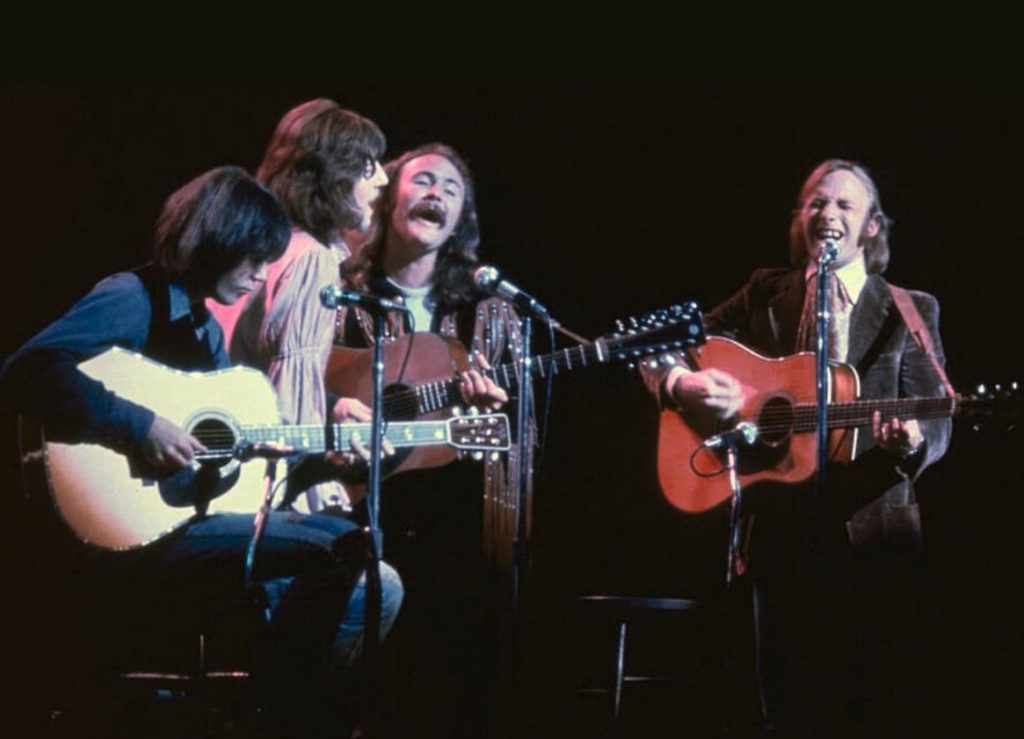
A Hymn to Hope and Unity Amidst a Generation’s Defining Moment
“Woodstock”, though penned by Joni Mitchell, became an anthem of the late 1960s counterculture movement through Crosby, Stills, Nash & Young‘s powerful rendition on their 1970 album, Déjà Vu. While Mitchell herself didn’t attend the legendary music festival, her song perfectly captures the spirit of hope, unity, and the yearning for a better world that defined the Woodstock generation. CSNY’s version, with its electric energy and soaring harmonies, amplified this message, cementing the song’s place in rock history.
The story behind the song is quite fascinating. Joni Mitchell, unable to perform at Woodstock due to a scheduling conflict (her manager felt it was more important for her to appear on The Dick Cavett Show), experienced the festival vicariously through news reports and stories from her then-boyfriend, Graham Nash (of CSNY), who had performed there. Inspired by his accounts, Mitchell wrote “Woodstock” in a hotel room in New York City, capturing the essence of the event without ever having been present. She described it as a feeling of “complete awe” at the sheer scale and spirit of the gathering.
While Joni Mitchell’s original version is a more folk-oriented acoustic piece, Crosby, Stills, Nash & Young transformed it into a powerful rock anthem. The song opens with a gentle, almost hymn-like quality, building gradually with Stephen Stills’s distinctive electric guitar riff and the group’s signature harmonies. The lyrics paint vivid images of the journey to Woodstock, “We are stardust, billion-year-old carbon,” evoking a sense of cosmic connection and the shared human experience. The chorus, “We are golden,” becomes a declaration of hope and the potential for a brighter future.
The song resonated deeply with a generation grappling with social and political turmoil, including the Vietnam War. “Woodstock” became a symbol of peace, love, and the desire for change. It captured the feeling of a generation coming together, seeking something more meaningful than the status quo. The lines “We are billion-year-old carbon” reflected the vastness of time and the interconnectedness of all beings, a theme that resonated with the burgeoning environmental movement as well. The phrase “caught in the devil’s bargain” probably reflected the dark side of the era, the war, assassinations and social unrest.
Although “Woodstock” was not released as a single by CSNY, it received significant airplay on FM radio stations, further solidifying its status as an anthem. It continues to be a staple of classic rock radio, reminding listeners of a time when music played a central role in shaping cultural consciousness. The song has been covered by numerous artists over the years, demonstrating its enduring appeal.
Revisiting “Woodstock” today evokes a strong sense of nostalgia for those who lived through the era. It’s a reminder of the power of music to unite people and inspire hope, even in the face of adversity. For younger generations, it offers a glimpse into a pivotal moment in history and a testament to the enduring power of the counterculture movement. The song’s message of peace, love, and unity remains relevant even today, making “Woodstock” a timeless classic. It’s a song that speaks to the human spirit’s enduring quest for connection and a better world, a message as potent now as it was over half a century ago.